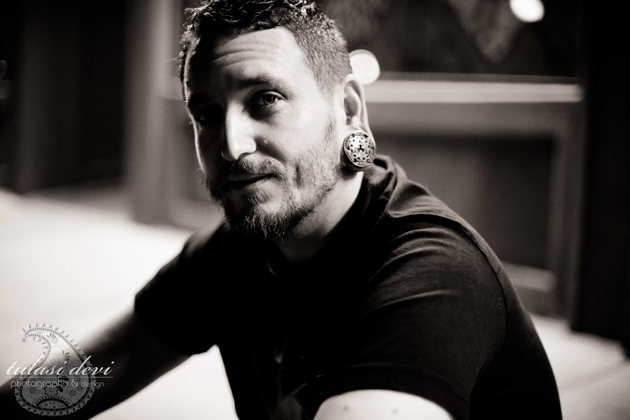
When we caught up to him after a morning jog at his home in Hawaii, we expressed some interest that Evan Bartholomew (aka Bluetech) had chosen Laika, the Russian dog remembered as the first living being to be launched into earth orbit, as the title of the leadoff track of his 13th album (really an EP), Spacehop Chronicles Vol. 1. Not just that he might have chosen the famousin-Russia dog, but that the title mirrors another ambient track recorded by Norwegian ambient pioneer Geir Jenssen (aka Biosphere) in 1997.
Bartholomew hadn’t heard it, but just as well, as the two pieces bear little resemblance. Biosphere’s stark, meditative piece, anchored by a simple two-note piano figure and trimmed with gauzy, Russian language mission-control voices, trailing off into an endless and grimly melancholic fade. By contrast, Bartholomew’s piece evokes a playfulness and buoyant spirit, fragmentary melody lines colliding gently against each other like friendly singlecelled amoebas playing slow motion bumper cars in a turquoise Petri dish, as if Biosphere was reflecting on the dog’s lonely death, and Bartholomew on his reportedly spunky and eager-to-please demeanor.
“We actually did a prose piece to go with [the song],” Bartholomew says. “If you go to my bandcamp page and look up Spacehop Chronicles, you’ll see it posted there. We’re writing a sort of alternative history from the first person perspective of Laika; each release of Spacehop Chronicles will be another piece of that, in a more melancholic tone. But in our version, Laika doesn’t actually die, but goes on to explore space.”
If this all sounds conjured from the mind of a grown-up space/sci-fi geek, Bartholomew will readily plead guilty.
“I’m a huge fan of the graphic novel as an art form,” he says. “And there’s something about serialized narrative that I think is really exciting. People waiting to get the next piece. ‘Oh, here’s something really cool, enjoy it, but ah, it’s not done yet, where’s the next bit of narrative?’ So, in kind of bemoaning the loss of the album in our digital download age, and the age of the single in our sound-bite culture, I kind of wanted to bring back that mystery of a concept album … but instead of a bloated fourvolume massive set, do it as a serialized, graphic novel format.”
Bluetech has produced down-tempo electronica for better than a decade now, a virtual eternity in the elusive and everchanging electronica club scene. His work has ranged from ambient/drone to psy-hop to progressive, released variously under his given name and his pseudonym. Bred from the early days of Burning Man and the burgeoning club scene that grew up in its smoky wake, Bartholomew draws from a variety of electronic disciplines, but cites unapologetically British ambient clubsters like Alex Paterson (The Orb), Richard D. James (aka Aphex Twin) and Ben Watkins ( Juno Reactor) as the bedrock of his work, as well as the early Berlin school electronic pioneers (Tangerine Dream, Jean-Michel Jarre, et al) and the space jazzers (Herbie Hancock, Sun Ra). Longtime electronica junkies are prone to lowering their heads in reverence at names like that, but the modern electronica scene, to Bartholomew’s mild chagrin, has a pretty short memory.
“It’s amazing to me,” he laughs.
“I’ve been releasing records for 12 years, 13 years almost, and man do I feel old! Most people don’t know what was happening six or seven years ago, let alone 13 years ago.
“My classic moment of the state of today’s scene came when Skrillex posted up an Aphex Twin track, and people complained. ‘Where’s the drums? Where’s the bassline?’ They just didn’t get it.”
So the scene is rewriting itself constantly. A mile wide and an inch deep?
Bartholomew pauses. “It is in North America,” he answers carefully. “Outside of North America, I get booked with The Orb, Steve Hillage, Juno Reactor — you know, classic artists. It’s a super honor for me to be considered, if not in the same tier, in the same aesthetic universe as those guys. Those are the artists I grew up listening to.”
As for Spacehop Chronicles Vol. 1, one is likely to detect some of the earlier generation’s DNA coursing through the proceedings — sequencer lines, subdued chill passages of restrained lushness, and even a bit of scrape. Digital music is all too often a victim of its own precision — clean and fast and shiny plays fine on the dance floor, but the form can dissolve into its own shimmer when mined for humanity, when framed as a song rather than a track. Bartholomew is keenly sensitive to this — the closing “Light Years From Home” drifts in and out of aimless direction, fragmentary murmurs of harmony and texture surface and submerge, strung tenuously together by filaments of melody seemingly ready at anytime to vanish and let the whole thing collapse into disarrayed slumber.
This is a subtle art, lacing the perfection of digital music production with a hint of gentle chaos.
“I do like that, especially on Spacehop,” Bartholomew says. “I wanted to give it a little something of ‘not quite right.’ I wanted to go a little left-of-center with the progressions. … I used to make very clean, very precise music, and maybe it’s me getting older, but now I found I’m drawn to a little bit of dirt.”
Bartholomew credits his classical piano training for his compositional sensibilities, a background relatively uncommon in the electronic scene.
“I spent a fair amount of time studying classical piano, where I got to the point to the where I was actually re-writing my etude and composition pieces I was given to perform, because I was way more interested in doing them my way,” he laughs. “And then I heard [The Orb’s] ‘Little Fluffy Clouds.’ And it was all over.”
Respond: [email protected]














